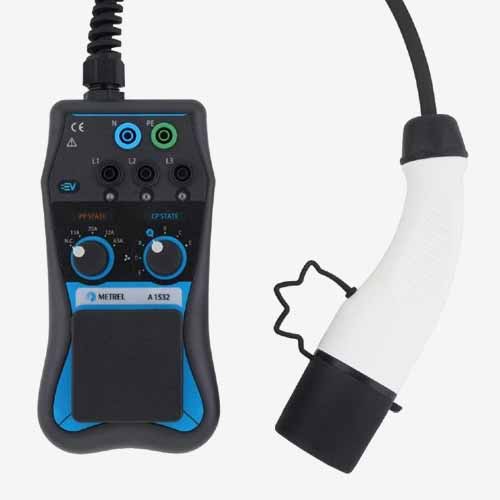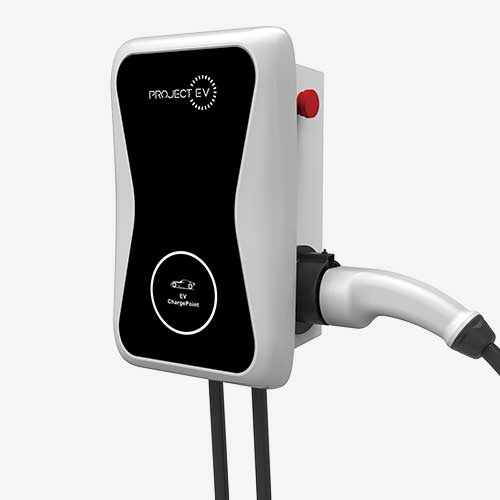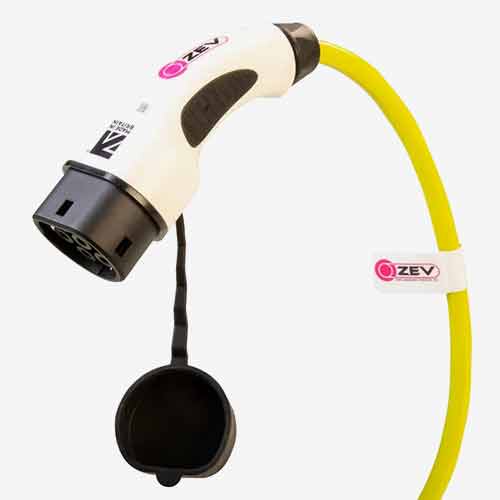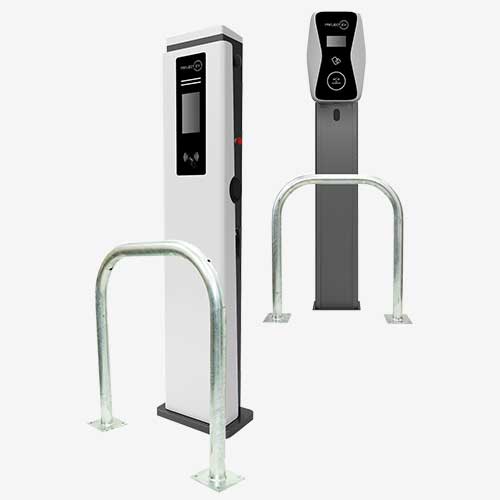About Electric Vehicle Charging
An electric car can be charged at home, at work, or at a public charging point. You can charge your vehicle at home by using a regular domestic 3-pin socket, however, a dedicated home EV charger is the better option by far.
Dedicated EV home chargers typically deliver around 7kW of power. In contrast, most vehicle manufacturers limit the current drawn from a standard domestic 3-pin socket to 10A or less, which equates to a maximum of 2.3kW. A 7kW home charger, therefore, delivers approximately three times as much power and is approximately three times as fast as using a domestic socket.
Charging points at work help make electric cars viable for commuters who live further away from their homes. If your work doesn't have an electric vehicle charge point installed, it could take advantage of the Government's Workplace Charging Scheme (WCS).
Public EV chargers can be found at service stations, car parks, supermarkets, cinemas, and even on the side of the road. The network of public chargers continues to grow at an incredible rate.
Popular Products
-
Metrel A1532 EVSE Adapter: A versatile tool for testing Mode 3 EVSE with Type 2 connectors. Compatible with Metrel installation testers, it ensures the safety and functionality of EV chargers by simulating various vehicle statuses and fault conditions.
-
Sonel EVSE-01 Adapter: Designed for thorough testing of AC EV charging stations with Type 2 connectors. It simulates the charging cable and vehicle connection status to enable various operating states for diagnostics. The adapter supports measurements like fault loop impedance, insulation resistance, and residual current device parameters.
-
Project EV Pro Earth Wall Charger (7.3kW): A single-phase AC charger for domestic use. It simplifies installation with built-in Pro Earth protection, eliminating the need for an additional earth spike. Features include a Type 2 socket, integrated RCBO for protection, IP65 dust and water resistance, time-shifting for off-peak charging, solar compatibility, a cable lock system, dynamic load management, and a CT clamp for easy setup.
-
Project EV Pro Earth Wall Charger (22kW): A three-phase AC charger for residential and commercial use. It includes built-in Pro Earth protection, removing the need for an extra earth spike, and is compatible with solar setups. Features RFID card control for easy operation, comprehensive electrical protection, and an IP65 rating for durability.
-
ZEV Type2-Type2: 32A Single Phase EV Charging Cables designed for above-ground use. They are coiled, covered in dirt-resistant polyurethane, and come in a discreet grey colour. Insulated power cores to ensure safe current flow and compatibility with electric vehicles that have a Type 2 charging inlet. Available in lengths of 3m, 5m, 10m, or 20m.
-
ZEV Type2-Type1: 32A Single Phase EV Charging Cables are straight, covered in dirt-resistant polyurethane, and come in a discreet grey colour. Insulated power cores to ensure safe current flow and designed for electric vehicles with a Type 1 charging inlet. Available in lengths of 5m, 10m, or 20m.
-
Fluke Type 1/ Type 2 Zero Adapters: Designed for use with the Fluke FEV350 EV Charging Station Analyser. They enable the FEV350 to assess the safety and functionality of EV charging stations. Available in two versions: Type 1 and Type 2.
-
Megger EVCA210 Charging Plug: Suitable for testing Mode 3 AC EV charging points. Simulates the connection of an electric vehicle, supporting Type 1 and Type 2 connectors, and works with single and three-phase points. Key features include Proximity Pilot (PP) and Control Pilot (CP) simulation, and a PE pre-test for detecting hazardous voltages. Type 1 or 2 plugs available.
FAQs
-
How does electric vehicle charging work?
EV charging involves connecting the vehicle to a power source. There are three main types: Level 1 chargers use a standard outlet and require up to 24 hours; Level 2 chargers use a 240V outlet and take 4-8 hours; DC fast chargers, the quickest, provide a substantial charge in about 30 minutes. Charging can occur at home, work, or public stations, with home charging being convenient for daily use and public stations useful for longer trips. Some public chargers are free, while others charge based on usage. -
What are the different types of EV chargers?
There are three main types of EV chargers: Level 1 chargers use a standard 120V outlet, taking up to 24 hours for a full charge, suitable for overnight home use; Level 2 chargers require a 240V outlet and typically charge an EV in 4-8 hours, commonly found at homes, workplaces, and public stations; Level 3 chargers, or DC fast chargers, are the fastest, providing a substantial charge in about 30 minutes by converting AC to DC power, and are usually located at public stations along highways. -
How long does it take to charge an electric vehicle?
Charging time for an EV varies by battery size and charger type: Level 1 chargers (120V) can take up to 24 hours for a full charge; Level 2 chargers (240V) typically require 4-8 hours; DC fast chargers are the quickest, delivering a significant charge in about 30 minutes by converting AC to DC power. -
How much does it cost to charge an electric vehicle?
Source: GOV.UK (Data from 09/2024 & may change over time)
Charging a medium-sized electric car at home typically costs around 8p per mile, about half the price of fueling a comparable petrol vehicle, which costs around 13p to 17p per mile as of January 2024. Some suppliers, like Octopus Energy, provide tariffs that reduce home charging costs to under 3p per mile. Public charging costs are generally comparable to petrol, according to Zapmap data. -
What do I need to charge my electric vehicle at home?
To charge your EV at home, you'll need a dedicated wall box for faster and safer charging, a 240V outlet for Level 2 chargers, professional installation by a certified electrician, and a compatible charging cable. This setup ensures convenient and efficient home charging, preparing your battery for daily use. -
How often do I need to charge my electric vehicle?
How often you need to charge your EV depends on your daily driving distance, battery capacity, and charging station availability. Most EVs offer a range of 125 to 348 miles per charge. It's recommended to recharge when the battery drops to about 30% and aim for 80% to optimize battery efficiency and longevity. For many drivers, overnight home charging is sufficient, especially with a regular daily commute. -
How do I find EV charging stations on a road trip?
To find EV charging stations on a road trip, use tools and apps like Zapmap, which helps plan your journey, locate stations along your route, and check real-time availability. Another useful option is Roadtrippers, which features a trip planner with access to over 30,000 charging stations, allowing you to add charging stops and explore destinations. -
What powers electric car charging stations?
Electric car charging stations mainly draw power from the electrical grid, which includes a mix of renewable and non-renewable sources such as natural gas, coal, nuclear, wind, solar, and hydroelectric power. Some stations also use renewable energy sources directly, like solar panels or wind turbines, to supplement grid power and lower their carbon footprint.


 Electric Vehicle EVSE Testers
Electric Vehicle EVSE Testers
 Electric Vehicle Charging Stations
Electric Vehicle Charging Stations
 EV Charging Cables
EV Charging Cables
 Electric Vehicle Charging Accessories
Electric Vehicle Charging Accessories
